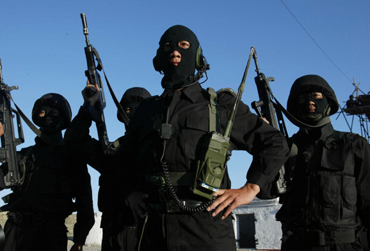
UZBEKISTAN HOSTS SCO ANTI-TERRORIST DRILL
Publication: Eurasia Daily Monitor Volume: 3 Issue: 50
By:

The member states of the Shanghai Cooperation Organization (SCO) conducted a joint anti-terrorist drill in Uzbekistan, March 5-9. The drill itself was aimed at developing greater interoperability among the Special Forces of the SCO states (China, Russia, Kazakhstan, Kyrgyzstan, Tajikistan, and Uzbekistan) in tracking and combating terrorists, with emphasis placed on groups that would seek to disrupt the political stability of Central Asia by attacking state infrastructure. The exercise itself reportedly concentrated on Uzbek infrastructure, and Special Forces and supporting units examined and rehearsed ways of preventing terrorists from sabotaging key facilities, as well as practicing joint actions to rescue hostages. One exercise involved a joint rescue operation following a mass terrorist attack on vital state infrastructure facilities. Ambassadors from China, Kyrgyzstan, Russia, and Tajikistan as well as a representative from Kazakhstan’s embassy in Uzbekistan watched the exercise, which was widely praised. Observer states included Pakistan, India, and Iran (Xinhua, March 11).
Reporting on these events in Uzbekistan was understandably under strict government control, yet the regime gave maximum publicity to the security dividend potentially on offer from such multilateral cooperation. Tashkent has placed greater emphasis on the security protection offered by the SCO umbrella, particularly since the downturn in its bilateral relations with the United States and its multilateral relations with NATO. Western observers of Uzbekistan’s Special Forces, despite the in-country training of U.S. Special Forces A-teams prior to 9/11, have noted the fit infantry display, but not any genuine advance towards developing further these elite units. The cooperative façade, therefore, was more political in its intention than it was in its examination of military effectiveness.
The SCO’s anti-terrorist drill, under the auspices of the Regional Anti-Terrorism Structure (RATS) based in Tashkent, focused on the mechanics of arranging a joint response to terrorist threats within Central Asia. These exercises, long planned within the SCO’s security agenda, have taken on a new significance for the Tashkent regime, which is keen to play its part in Central Asia’s security dynamics in the wake of its deteriorating relations with the West.
Tashkent, interested in the potential of the SCO for furthering its own security, has found widespread support among member states for closer security integration. Indeed, the Kazakh parliament’s Majlis (lower chamber) has recently approved a draft law on the country’s ratification of the agreement on the database for the RATS. This will be placed in the Senate (upper chamber) for more detailed consideration. “The agreement sent for your consideration envisages a normative basis for legal mechanisms that aim to give practical dimension to the efforts made by SCO participating countries in their fight against terrorism,” explained Vladimir Bozhko, deputy head of Kazakhstan’s National Security Committee (NSC). Like other intelligence agencies in the region, Kazakhstan’s NSC regards the SCO RATS database as an important part of the mechanisms aimed at forestalling terrorist acts in Central Asia. “The practical value of information exchange has already become evident. Summaries of information on a wide range of issues are coming. One of the last summaries on a terrorist training center is a matter of practical interest for the NSC, the Interior Ministry, and the whole country,” Bozhko said. The agreement has already been ratified in China, Tajikistan, and Uzbekistan, and is currently under consideration in the Kyrgyz parliament (Interfax-Kazakhstan, March 9).
Such exercises held in Uzbekistan, a state central to the future development of regional security cooperation, are now placed under the most stringent reporting restrictions. This is a direct consequence of the regime reacting to widespread scaremongering concerning the activities of foreign journalists and seeking to place foreign NGOs under suspicion. On March 7 the Uzbek government passed a resolution affecting the work of foreign journalists within Uzbekistan. “Accredited foreign journalists are forbidden to call for changes in the existing constitutional order by using force; violate the territorial integrity of the republic; provoke war, violence, cruelty and national, racial, or religious hostility; they are also forbidden to interfere in the domestic affairs of Uzbekistan,” the resolution said (Uz.Report, Tashkent, March 7).
Such extreme measures make any assessment of the Uzbek reporting of the SCO’s anti-terrorist drill much more complex. However, some tentative conclusions may be drawn. Despite the setbacks of the regime itself, whose military was once regarded as the most pro-Western of the Central Asian militaries, Tashkent has staked its security on closer integration within the SCO and now looks to Russia and China for providing security models for its own Special Forces and the use of these forces in combating “terrorist” crisis. Despite the work carried out with such forces by the United States, United Kingdom, and other NATO members, Uzbekistan maintains essentially Soviet-modeled Special Forces, less able to cope with a terrorist emergency, but useful to the regime in other ways.
At the political level, it is intriguing to note the sources of support for Uzbek President Islam Karimov’s security gamble; Kazakhstan has now furthered the efforts of the SCO to present itself as the multilateral security body most concerned with Central Asian Security. Of course, these arrangements are fine in theory, but will they bail Uzbekistan out of an internal security crisis provoked by regional or international terrorists, or will Tashkent’s participation in the SCO protect the Karimov regime from further domestic instability?




